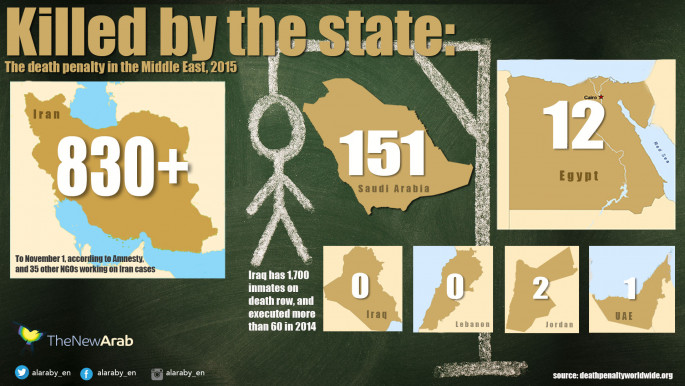Saddam-era Iraqi leader condemned to death in 'genocide' case
Saddam-era Iraqi leader condemned to death in 'genocide' case
A former Baathist official, Abdulbaqi Abdulkareem al-Saadoun, sentenced to death by an Iraqi criminal court on Monday, in a series of 'politicised' death penalties that may hinder reconciliation efforts.
2 min read
A series of death penalties were issued to those who severed under Saddam's rule [Getty]
A senior Saddam-era government official accused of genocide was on Monday sentenced to death in what critics have called a "politicised" move by the Iraqi judicial system.
Abdulbaqi Abdulkareem al-Saadoun, a noted Iraqi Baath Party leader, was accused of "committing violations against the people of Iraq".
Saadoun was also convicted of having links to armed groups fighting against Iraqi troops and civilians after 2003.
"Saadoun was convicted of committing genocide against the Iraqi people under the previous regime and of leading armed groups after the fall of the regime," an unnamed source from inside the court told The New Arab.
Iraqi forces arrested Saadoun in July 2015, in Kirkuk province, northern Iraq.
The sentence has been criticised as politically motivated.
Mohammad al-Mashhadani, a representative of Iraq's Union of National Forces, said the move may disrupt reconciliation efforts in Iraq.
"The last few weeks have seen a number of serious deliberations across the presidency, government and parliament over the importance of reconciliation and the integration of former political and military personnel who served in Iraq before 2003," Mashhadani told The New Arab.
"A number of Iraqis from the Saddam era were contacted in attempt to convince them to sit through a dialogue with the [current] government," Mashhadani said. "Preparations were also being made to integrate them in the political process in future."
Saadoun's death sentence is only likely to deter former officials, opposition figures and civil servants from engaging with the political process, said Mashhadani.
"It shows that the Iraqi government is not serious over reconciliation," he said.
Mashhadani urged Iraqi Prime Minister Haider al-Abadi and the speaker of parliament, Salim al-Jabouri, to intervene to stop politicised court sentences.
He also warned that a number of judges connected to former Iraqi Prime Minister Nouri al-Maliki had issued hundreds of harsh sentences "based on no evidence or proof".
The death sentences in particular have raised a number of concerns through Iraqi political circles.
A series of similar sentences were previously issued to politicians and Baath party officials who served under Iraq’s former president.
Human rights organisations have issued warnings over the lack of independence of Iraq's judiciary, and called for the retrial of some defendants.
There are more than 1,700 inmates on death row in Iraq, though a moratorium saw none executed in 2015.
Abdulbaqi Abdulkareem al-Saadoun, a noted Iraqi Baath Party leader, was accused of "committing violations against the people of Iraq".
Saadoun was also convicted of having links to armed groups fighting against Iraqi troops and civilians after 2003.
"Saadoun was convicted of committing genocide against the Iraqi people under the previous regime and of leading armed groups after the fall of the regime," an unnamed source from inside the court told The New Arab.
Iraqi forces arrested Saadoun in July 2015, in Kirkuk province, northern Iraq.
The sentence has been criticised as politically motivated.
Mohammad al-Mashhadani, a representative of Iraq's Union of National Forces, said the move may disrupt reconciliation efforts in Iraq.
"The last few weeks have seen a number of serious deliberations across the presidency, government and parliament over the importance of reconciliation and the integration of former political and military personnel who served in Iraq before 2003," Mashhadani told The New Arab.
"A number of Iraqis from the Saddam era were contacted in attempt to convince them to sit through a dialogue with the [current] government," Mashhadani said. "Preparations were also being made to integrate them in the political process in future."
Saadoun's death sentence is only likely to deter former officials, opposition figures and civil servants from engaging with the political process, said Mashhadani.
"It shows that the Iraqi government is not serious over reconciliation," he said.
| Read more: Iraqi Kurds against the release of Saddam's defence minister |
Mashhadani urged Iraqi Prime Minister Haider al-Abadi and the speaker of parliament, Salim al-Jabouri, to intervene to stop politicised court sentences.
He also warned that a number of judges connected to former Iraqi Prime Minister Nouri al-Maliki had issued hundreds of harsh sentences "based on no evidence or proof".
The death sentences in particular have raised a number of concerns through Iraqi political circles.
A series of similar sentences were previously issued to politicians and Baath party officials who served under Iraq’s former president.
Human rights organisations have issued warnings over the lack of independence of Iraq's judiciary, and called for the retrial of some defendants.
There are more than 1,700 inmates on death row in Iraq, though a moratorium saw none executed in 2015.
 |







 Follow the Middle East's top stories in English at The New Arab on Google News
Follow the Middle East's top stories in English at The New Arab on Google News

![Beirut stadium [Getty]](/sites/default/files/styles/image_330x185/public/1235817272.jpeg?h=a5f2f23a&itok=0UZr2fIL)
![Israeli forces destroyed a religious shrine in the village of Shama in southern Lebanon [Getty]](/sites/default/files/styles/image_330x185/public/2184560625.jpeg?h=a5f2f23a&itok=Ge_H4GfP)